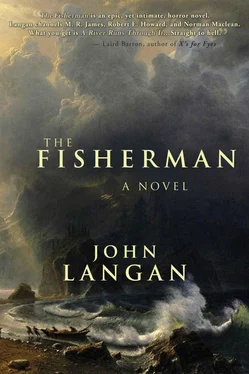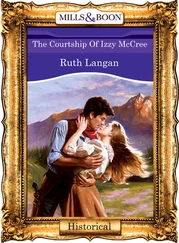Italo shoves him and says, “Pay attention. He said not to look at it.”
Jacob shakes his head, which is spinning.
“All right?” Italo asks.
Blushing, Jacob nods.
The last axe marked, Rainer folds the clasp knife and returns it to Italo, who takes it with his thumb and forefinger, as if it’s been dipped in some toxic substance. Having learned his lesson, Jacob is doing his level best not to stare at the plain door to the house, on which the figure Rainer cut this morning is writhing, crawling all over itself like a mess of snakes. Instead, Jacob keeps his eyes on the ground, where the knife Rainer left there is shimmering at the edges, like butter starting to melt on a hot skillet. He watches Rainer bend to tug the knife free, and sees how it stretches as he does so. For an instant, it’s on the verge of losing its form altogether, and then it’s a dinner knife Rainer’s slipping into the front pocket of his pants. Jacob’s already feeling like maybe he’s in a bit over his head, and what Rainer says next doesn’t help his nervousness. Addressing himself to the newer members of the group, Rainer says, “You have heard about this woman, this Helen, yes? She used to be dead and now she isn’t. Now she walks around, telling people things they shouldn’t know and attacking our families. No more. We are here to put a stop to it. For all of today, I have trapped her in this place. I have changed it, so that it will draw off the power that sustains her, make her weak. But although her strength is less, she is still dangerous. She may say all manner of things to you, tell you terrible things about yourself, or the ones closest to you. It is the last weapon left to her, and she will use it to whatever advantage she can. You must ignore her. It is not easy, but it is the only way.” Before any of them can reply, much less decide that this is more than any one of them signed up for and run, Rainer walks to the front door and pushes it in. Jacob has the impression that the symbol on the door hangs in the air, wrapping itself around Rainer as he passes through it. With a deep breath, Jacob follows him.
Inside, the air is clogged with the smell of damp earth and must, a combination that forces its way up Jacob’s nose, into his mouth, down his throat. It’s like trying to breathe through dirt. His body responds with a fit of coughing and sneezing. His eyes, his nose, stream; his chest convulses. Dimly, he can hear the other men hacking and wheezing. After what feels like hours, his lungs succeed in clearing enough of what’s invaded them for Jacob to breathe. They aren’t easy breaths he takes in, but for the moment, they’re sweet as honey. He wipes his eyes clear, and the cause of the air’s thickness is revealed. The walls, ceiling, floor, all of the room he’s entered is dark, furred with dense, black mold. It’s impossible to tell where the windows are. The room is full of gray, diffuse light. Mold envelopes what must have been a steamer trunk. It joins a trio of chairs along the opposite wall. It transforms a small table into an enormous toadstool. The only thing in the room clear of mold is the woman standing in the middle of it, at the center of a large puddle of dark water.
Jacob knows he shouldn’t look at the woman, at Helen. But she’s been on the lips of everyone in the camp for the last several days, first for her death, then for her return from it, and then for her assorted activities after that. More people claim to have seen her than is likely possible. Their reports have assembled a hodgepodge monster in Jacob’s imagination, a hunchback whose right arm is the tentacle of a cuttlefish, whose skirts rustle and shift in odd ways, whose shadow doesn’t stay in place, but ranges around her like a dog on a long leash. It would be remarkable if he didn’t lift his eyes to her.
What he sees might be considered a lesson in the difference between rumor and reality. Helen’s right arm hangs at her side, no sea-beast’s limb, the odd dips and bulges in its pale skin mementos of the beatings inflicted on it by Italo’s hammer and Regina’s frying pan. Her dress is like a drape thrown over a pile of rocks, but that’s due to the injuries that took her from this life. As for her shadow, though it’s difficult to see in the gloom, Jacob’s reasonably sure it isn’t moving. What catches his attention is the fact that the woman is soaked, from head to foot, as if she’d been doused with a barrel of water the second before Rainer stepped through the front door. Her hair, her dress, are sopping. Her skin shines. It almost looks as if the water is flowing out of Helen, but that’s probably a trick of the light. The rumors are correct in one detail, the woman’s eyes, which are dull gold, the pupils black holes. Should those eyes turn in his direction, Jacob is ready to drop his gaze, but Helen is fixed on the man standing closest to her, Rainer.
There’s something about his posture, a certain formality, that calls to mind the professor in front of a lecture hall, the lawyer in front a witness, the priest in front of the altar. Rainer’s work clothes, his rough shirt and trousers, laden with the dust of his day’s labors, seem almost comically inappropriate. He should be wearing a suit, or the robes of a scholar or clergyman. The dead woman opens her mouth, and what sounds to Jacob for all the world like a low, throaty chuckle emerges. Jacob shifts from foot to foot. The laugh continues, spools out of the dead woman like thread snarling off a loom. It’s almost tangible. Jacob can practically feel it winding around him. There’s something inside it, a message for him and him alone. The message is extremely important. It concerns Lottie, Lottie and him. If he concentrates harder, lets the laughter tighten its coils about him, he’s sure he’ll be able to hear what it’s trying to say to him.
“Silence,” Rainer says.
The laugh stops. Helen frowns. Jacob shakes his head, as do the rest of the men.
“Who is your master?” Rainer says.
Helen answers in a voice like rocks cutting the surface of a stream. Jacob feels his bowels shudder. The others step back. She says, “His name is not for you.”
“Who is your master?” Rainer says.
“Ask Wilhelm Vanderwort,” Helen says.
That name sends a jolt through Rainer. He starts to speak, stops, and says a third time, “Who is your master?”
“The Fisherman,” Helen says.
Rainer nods. “Why has he come here?”
“To fish,” Helen says, her mouth twisting in a sly smile.
“Why is he fishing here?”
“The water runs deep.”
“For what does he cast his line?”
“No thing.”
There’s a pause, then Rainer says, “Not whom, surely?”
“Surely,” Helen says.
“Who?” Rainer says.
“You are not fit to hear the name,” Helen says.
“Who?”
“You could not stand the sound of it.”
“Who?” Rainer says again. Jacob has the sense of a ritual being observed in the exchanges between Rainer and Helen. She is under no obligation to answer his question’s first asking, or its second, but if he persists, she is obligated, he’s not sure how, to surrender the information he demands. Rainer is on the verge of delivering his request a fourth time when Helen utters a word that Jacob has never heard before. It might be “Apep,” but she says it too quickly for him to be sure.
Rainer appears to recognize the name. He says, “Nonsense. He would not dare.”
“You have asked,” Helen says, “and I have answered. Would you prefer another name? Tiamat? Jormungand? Leviathan?”
“The truth!” Rainer shouts. “The Compacts—”
“I heed the Compacts,” Helen says. “Do not blame me for what you cannot accept.”
“He does not have the power,” Rainer says.
Читать дальше












